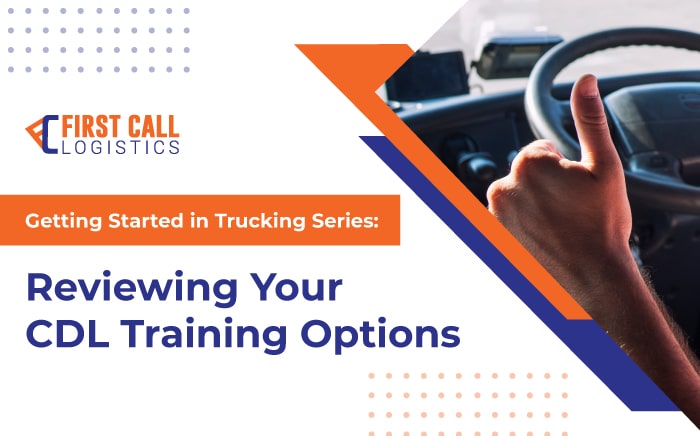Reviewing Your CDL Training Options

How you choose to complete formal driver training will play a major role in your trucking career. Only the safest and most capable drivers receive a commercial driver’s license (CDL), which means exhaustive study and behind-the-wheel preparation are needed before even landing a job. Here’s a look at how private and sponsored driving schools differ, which resources will prove most valuable for readying yourself for your skill tests, and why obtaining a CDL through accredited training is more important now than ever.
Choosing Between Private and Sponsored Driving Schools
A driving school should serve two major functions: to prepare you for the CDL skills test via classroom study and hands-on driving experience, and to provide you with job opportunities upon your training’s completion. While obtaining a CDL is the first real step toward a successful trucking career, your school’s job placement record can be just as critical.
Both private and commercial training schools can serve both of these functions, but there are some key differences between the two. Private trucking schools operate independently of any specific trucking company, though a good one likely has a network in place to place drivers in jobs upon graduation. These require tuition payment upfront and can vary greatly in price from a few thousand dollars to $10,000 or more. Since private training isn’t sponsored by a specific company, drivers are free to consider and compare different companies during the hiring process and potentially negotiate better pay and benefits.
Sponsored or commercial training doesn’t afford the same flexibility in terms of job options, but it significantly lowers (or even eliminates) the upfront cost. A commercial school will treat your training as an investment in its future employee, sometimes covering the full cost or offering to pull tuition in smaller installments from your first paychecks after you’re hired on. Sponsored training also tends to be more fast-paced than the private school environment. Both types of schools vary in the type of experience they provide, so be sure to research one with a strong track record of comprehensive training and job placement.
Can You Get a CDL without Formal Training?
Earning your CDL takes study and preparation for a battery of skill tests. Technically this study could be done on your own without any formal training (though FMCSA policy changes are trying to stamp this out) — but even if you pass your CDL tests with flying colors, it can be extremely difficult to find a job in the industry without training from an accredited driving school. Most companies have policies in place requiring new drivers to graduate from a legitimate program and to produce documentation verifying at least 140 hours of instruction.
The FMCSA also recently debuted Entry-Level Driver Training (ELDT) regulations requiring drivers to complete their training with a registered provider before obtaining a CDL or specified endorsement for the first time. As of February 7, 2022, these ELDT rules are in effect for all those not already holding a Commercial Learner’s Permit.
Driver Training Is Changing: How to Navigate the Training Provider Registry
While the barrier to entering the industry requires training to safely operate a commercial vehicle, the fact is the country needs more drivers. The FMCSA recently compiled tons of useful resources to get new drivers into the workforce, including the training provider registry which locates verified training providers for entry-level drivers.
These new ELDT regulations also establish a set of baseline requirements for driving instructors, including at least two years behind the wheel and all the necessary endorsements needed to properly ready a driver-in-training to safely operate a commercial vehicle.
Resources for Practice Exams
While we’re on the topic of free resources, be sure to check out CDL practice quizzes before tackling the real thing. These practice tests are everywhere on the internet, but will always be available entirely free of charge on official government websites like the DMV page. Don’t let the first time you experience the CDL written test be when it actually counts — get some reps in with these practice exercises so you know what to expect when the time comes.
Learn More About Carrier Opportunities with First Call Logistics
At First Call, we’re committed to supporting our carrier network with the resources necessary to be successful. To learn more about First Call’s dedicated and transactional freight opportunities, flexible payment options, and 24/7 carrier support, contact us today.
The 3PL You’ve Been Looking For
Building and managing cost-efficient supply chains is a full-time job. First Call’s rare combination of in-house assets, expert problem-solving and track record of stellar customer service makes us the 3PL of choice for carrier partners looking to make the most of their miles.
“First Call always paid on time and would get me back-hauls whenever possible which was great.”
– Wayne, Carrier
More Resources for FCL Carriers:
Get the latest supply chain news and updates directly to your inbox.
